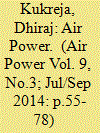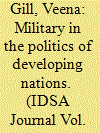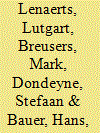|
|
|
Sort Order |
|
|
|
Items / Page
|
|
|
|
|
|
|
| Srl | Item |
| 1 |
ID:
137826


|
|
|
|
|
| Summary/Abstract |
From the end of the last century, it has been seen that the nature of war and armed conflict has been changing significantly, primarily due to two reasons, namely, the constantly evolving geo-political equations; and the unparalleled developments in technology, which were once considered to be a figment of the imagination. The world order today is changing at a rate that may be termed as illusory. The pace of the change may be comparable to the times that followed the defeat of Napoleon in 1815 and the defeat of Germany and Japan at the end of World War II in 1945. These changes, coupled with the advancements in technology, have significant implications on the nature of war, and, hence, national strategy, military strategy and force structure.
|
|
|
|
|
|
|
|
|
|
|
|
|
|
|
|
| 2 |
ID:
115823


|
|
|
|
|
| Publication |
2012.
|
| Summary/Abstract |
Academic debate on Rwanda has significant thematic gaps, and does not usually make use of a theoretically informed comparative framework. This article addresses one thematic gap - the distinctive approach of the RPF-led regime to political involvement in the private sector of the economy. It does so using the framework of a cross-national study which aims to distinguish between more and less developmental forms of neo-patrimonial politics. The article analyses the RPF's private business operations centred on the holding company known successively as Tri-Star Investments and Crystal Ventures Ltd. These operations are shown to involve the kind of centralized generation and management of economic rents that has distinguished the more developmental regimes of Asia and Africa. The operations of the military investment company Horizon and of the public-private consortium Rwanda Investment Group may be seen in a similar light. With some qualifications, we conclude that Rwanda should be seen as a developmental patrimonial state.
|
|
|
|
|
|
|
|
|
|
|
|
|
|
|
|
| 3 |
ID:
184912


|
|
|
| 4 |
ID:
160297


|
|
|
|
|
| Summary/Abstract |
The detailed analysis of articles on Israeli literature that appeared in a wide range of French publications between 2000 and 2012 allows for exploration of the degree of politicisation in the critical reception in France of contemporary Israeli literature. The diversity of approaches to Israeli literature, and its evolution into a more intimate art form, shows a less politicised critical reception of Israeli literature than is commonly believed.
|
|
|
|
|
|
|
|
|
|
|
|
|
|
|
|
| 5 |
ID:
179834


|
|
|
|
|
| Summary/Abstract |
According to the ‘rebels-turned-narcos’ premise, increasing involvement in the illicit drug industry causes insurgent groups to lose sight of their political aims, as they shift their focus to profit-making. The (former) Colombian rebel group, the FARC-EP, became a paragon for this idea. Drawing on primary research, we argue that the FARC-EP’s involvement in the illicit drug economy was itself political. Their involvement included governance activities, which are by their very nature political. Furthermore, these activities formed part of the FARC-EP’s political project, aimed at ensuring the reproduction of the peasant smallholder economy. Our argument challenges the rebels-turned-narcos premise more broadly by showing why involvement in the illicit drug economy, on its own, is insufficient evidence to posit the depoliticization of an insurgent group.
|
|
|
|
|
|
|
|
|
|
|
|
|
|
|
|
| 6 |
ID:
131792


|
|
|
|
|
| Publication |
2014.
|
| Summary/Abstract |
The role of post-1991 ethnic-based federalism on conflicts along regional boundaries has been a topic of great dispute in Ethiopianist literature. This article sheds new light on the on-going debate based on original ethnographic material from the Afar-Tigray regional border zone. Contrary to other studies, conflicts appear to have reduced in that area. Two key questions are addressed: how do different groups lay future claims to land; and which role does the post-1991 government play in those claims to land and in reducing conflicts? The case study reveals that people materialise religion to lay future claims to land and that conflicts have reduced with increased involvement of the state over the past two decades, but that this reduction has come at a high cost and may therefore not be sustainable in the long term.
|
|
|
|
|
|
|
|
|
|
|
|
|
|
|
|
|
|
|
|
|